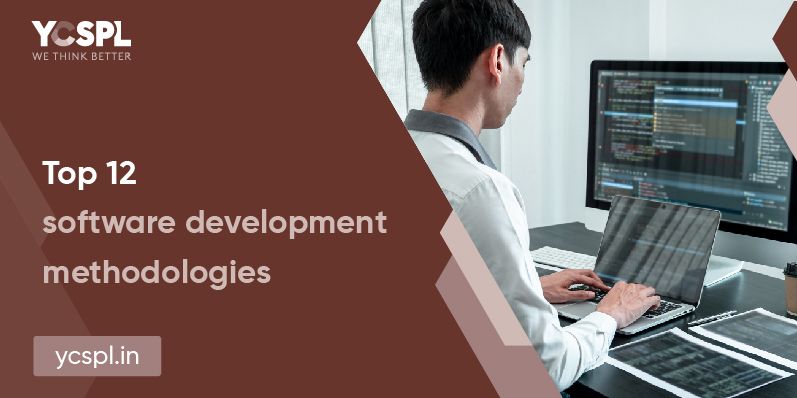
Any successful project involves subsequent stages that revolve around the careful implementation of structures that are pre-planned. Software development methodologies exist for this specific purpose which enables devising a structured workflow to meet all the requirements. The choice of the method is influenced by a lot of factors including the size of the business, the scale of requirement, nature of the software, goals, and others. A clear plan in place will help in better management of day-to-day operations.
The overall cycle of development and deployment will happen in a seamless, hassle-free manner this way since the framework is visualized from end-to-end to prior. The basic premise of this overall systematic approach is to meet the exact demands, requirements, goals, vision, and timelines of the project in place.
This paves the way to a disciplined management process which also allows room for frequent alterations during the development life cycle as per the changing demands. This method also dives deeper to minimize potential risks by segregating the overall operations into shorter time boxes that are named iterations. Each of these iteration periods ranges anywhere from a week to a month.
While lack of documentation is a significant disadvantage here since the framework focuses on the increased emphasis on working software, they also come with a lot of advantages. Constant feedback mechanism and transparent development process here leave no room for guesswork and hence improves product quality.
These software development methodologies have been gaining a lot of traction in these previous years because of all the benefits they bring to the table. This makes way for a continuous delivery model that will help different operations happen together simultaneously like development, security, and quality testing.
The major advantage that they thus offer is the faster product turn-around times that they offer and rapid deliveries right on schedule. At YCSPL, this is also one of the frameworks that we frequently rely on.
This is the dynamic framework that you can apply for projects of any nature. This is a great system for development cycles that are anticipated to encounter rapid changes and emerge higher along the way. A lot of iterations are done in a single go and it can align even the most time-exhaustive slow project to progress on track as envisioned.
This is one other development methodology that is widely popular and increasingly opted for. This is a classic method that drives all the development processes in a sequential linear flow. But since the model is rigid, there can be no iterations made after you cross the subsequent check mark stages which makes the overall model a little too uptight.
This method involves thorough prototyping prior to demonstrating the end product along with all the functionalities to the clientele beforehand. Unlike the traditional waterfall method, this allows more room for any iterations along the way. The model also offers a thorough look and feel of the finished software from the initial drafts. There is also a disadvantage of the end customer dropping the project soon after the initial prototype since they are not much sure of their project vision anymore.

This is again an iterative approach compared to other means of software development. This is intended for aligning operations involving larger teams and to strategically unify their overall process to progress towards a unified vision. A feature-focussed approach is how the framework progresses and this can help complete even the biggest of projects within shorter timeframes in an easy manner.
Quality is the major focus in this software development methodology and this reduces the overall risk involved for the developers since they allow more room for revisions and quick reviews then and there are subsequent stages. The overall objective here is to deliver all the high-priority functionalities that are in alignment with set expectations. The product is thus matured to have lesser iterations or defects with each stage.
Early identification, prevention, rectification, and reduction of overall project risks are the major take away of the spiral model. The project here is started at a smaller scale and all the risk assessment is done prior before diving further down the lane in each of the stages. Proper planning is done here which makes the entire framework more sophisticated and reliable. The model perfectly suits projects that are large in size and mission-critical.
This model involves continuous end-user involvement. The major aim here is to deliver systems that fit under the initially proposed budgets while also nearing completion of different phases at the previously fixed timelines.
Also known as an XP development methodology, this is used for the development of software in an environment that is unstable. The major goal here is to promote maximum flexibility in operation. Reduced cost is one other benefit here. Maximum customer involvement, turn-around times, and an overall reduction in the net development budget are a few advantages that XP methodology brings to the table.
The idea here is to keep the client well-informed and also include them as a part of the project from the end to end of all the stages in the development cycle. This will thus make way for collaborative development and also prevents all the back & forth in the software project that is usually bound to happen.
The focus here is to create software that is easily changeable. The overall framework is strategically focused here. The key advantage of this system is that it leaves more room for quick project completion even far less than the initially stipulated timelines.
Be it any software development methodologies that you opt for, the company that you hire to take over this effort matters. Hiring someone like YCSPL who carry a decade worth of experience can simply be game-changing altogether!
Change becomes the most dynamic, powerful source of progress you have

